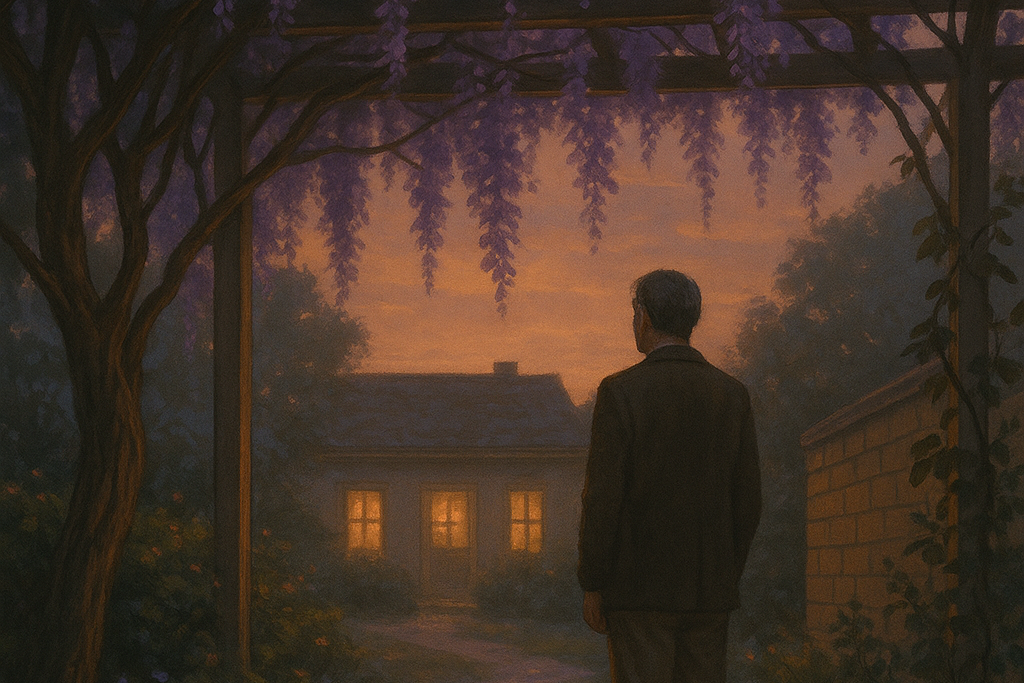人的一生,从出生到归于大地,是造物主奇妙而庄严的作为。正如《圣经·创世记》所言:“耶和华神用地上的尘土造人,将生气吹在他鼻孔里,他就成了有灵的活人。”(创2:7)人的身体不过源自尘土,与山石草木无异,然而,神将祂的灵吹入其中,使尘土拥有了超越自然的尊严,生命因此被赋予了永恒的意义。
人的灵魂,是造物主赋予的非物质本体,是生命的核心与尊贵的根源。灵魂使人拥有思想、情感、意志、道德感与自由,使人能够在天地之间自觉存在,能够向上思索,向善而行,向着永恒发出追问。正是灵魂的存在,使得人不再只是动物界的一员,也不再是自然律动下的无意义存在。人因灵魂而成为神的形象的反映(Imago Dei),超越了物质世界的局限。
灵魂的不灭,是圣经清晰的启示。传道书说:“尘土仍归于地,灵仍归于赐灵的神。”(传12:7)肉体终将朽坏,而灵魂将脱离时间与空间的限制,归回那位赐生命的神。这种存在方式的转变,并非虚无的消散,而是进入一个更深远、永恒的境界。

然而,灵魂的意义不仅限于个体的归宿。圣经告诉我们,灵魂所承载的品格、道德、信仰,具有深远的代际影响力。申命记记载:“恨我的必追讨他的罪,自父及子,直到三四代;爱我守我诫命的,我必向他们发慈爱,直到千代。”(申5:9-10)人的言行、信念、品格,不仅决定自身命运,也在无形中塑造着后代子孙的灵魂世界,成为跨越时间的属灵遗产。
更深一层地,当逝去的亲人朋友的灵魂,在神奥秘的计划中彼此聚合,形成一种无形的灵性联合体时,它们的影响力不再只是个体性的,而是群体性的。这种灵魂的聚合,通过家风、传统、道德观念,融入了家族、民族乃至整个人类社会的文化血脉之中。人的生活方式、思想倾向、道德标准,往往正是无数灵魂影响力的延续与沉淀。
中国传统文化虽然与圣经启示在本质上有所差异,但同样重视灵魂的延续与对后代的影响。儒家讲究“慎终追远”,通过祭祀祖先,维护与祖灵的联系,强调家风祖训的传承。道家认为,人的魂魄归于天地,生命与自然万物相通。《道德经》说:“人法地,地法天,天法道,道法自然。”道家讲究顺应自然,灵魂回归本体的思想,与灵魂不灭的观念在某种意义上呼应。中国传统社会中,家族习俗、礼仪、道德规范,正是无数代人灵魂影响的积淀。
无论是圣经所启示的属灵传承,还是中国文化中家族精神的延续,都指向一个共同的事实:灵魂并非孤立存在。个体生命的结束,并不意味着灵魂影响力的终结;相反,它以更隐秘、更深远的方式,塑造着现实世界中的人类生活与精神面貌。人的言行、德行、信仰,经过代际传递,逐渐沉淀为社会的习俗与文化,成为人类文明的一部分。
正是灵魂的存在,使人类社会有别于动物世界。动物世界遵循的是冷酷的生存法则,而人类社会却因灵魂的引导而建立起了家庭、社会、国家,制定了法律,推崇正义,创造了艺术与文化。灵魂的存在,使人心中有了爱与敬畏,有了对真善美的向往,有了对永恒的思考。人因灵魂而尊贵,因灵魂而不同于动物,因灵魂而在浩渺冷漠的宇宙中燃烧起温暖的光。
宇宙浩瀚无情,星辰冷静运转,而唯有灵魂,使人在这无边的寂静中发出赞歌。灵魂是人与神沟通的桥梁,是人超越有限物质,通向无限永恒的秘密。人因有灵魂而不止于尘土,生命因灵魂而有了超越时间与空间的价值。灵魂是尘土中的奇迹,是生命在造物主计划中的永恒印记。
灵魂不灭,是神奇妙作为的见证;灵魂延续,是生命尊贵意义的体现。尘土因灵而升华,生命因灵而超越。人的一生,不仅仅是尘土的循环,而是灵魂的旅程;不仅仅是肉体的行走,更是神圣永恒之光的追寻。
愿我们珍惜灵魂的尊贵,敬畏生命的源头,让自身的灵魂与那位永恒的造物主相连,使我们的存在,成为尘土中的奇迹,成为光明中的永恒。
Dust and Soul: The Miracle of Life and Its Eternal Continuance
A person’s life—from birth until returning to the earth—is the wondrous and solemn work of the Creator. As the Bible tells us in Genesis:
“Then the Lord God formed the man of dust from the ground and breathed into his nostrils the breath of life, and the man became a living soul.” (Gen. 2:7)
The human body indeed comes from dust, no different in substance from the rocks, trees, or fields. Yet when God breathed His Spirit into that dust, it was raised beyond nature’s limits, and life was given an everlasting significance.
The human soul is the immaterial essence bestowed by the Creator—it is the core and the noble source of every life. The soul grants us thought, emotion, will, moral awareness, and freedom; it allows us to exist consciously between heaven and earth, to reflect on our own being, to pursue goodness, and to seek the eternal. Because of the soul, we are more than animals or mere cogs in nature’s machinery. We are made in the image of God (Imago Dei), standing above physical confines.
That the soul does not perish is a clear truth revealed in Scripture. Ecclesiastes declares:
“The dust returns to the earth as it was, and the spirit returns to God who gave it.” (Eccl. 12:7)
While our bodies will decay, our souls will leave behind the boundaries of time and space, returning to the God who gave us life. This change in existence is not a fading into nothingness but a passage into a deeper, eternal realm.

Yet the soul’s meaning extends beyond an individual’s final destiny. The Bible also teaches that the character, morality, and faith carried by one soul leave a lasting imprint for generations. As Deuteronomy records:
“I, the Lord your God, am a jealous God, visiting the iniquity of the fathers upon the children to the third and the fourth generation of those who hate me, but showing steadfast love to thousands of those who love me and keep my commandments.” (Deut. 5:9–10)
One’s words, beliefs, and character do not merely shape one’s own fate; they subtly shape the spiritual world of descendants, becoming a living heritage that crosses time.
On an even deeper level, when the souls of departed loved ones gather in God’s inscrutable plan—merging to form an unseen fellowship—their influence becomes collective rather than merely individual. This communion of souls, transmitted through family customs, shared traditions, and shared moral principles, weaves itself into the cultural bloodstream of families, peoples, and ultimately of all humankind. Our ways of living, our collective inclinations, and our shared moral standards are often the sediment of countless souls’ influence.
Although Chinese traditional culture differs in many respects from biblical revelation, it likewise emphasizes the soul’s continuance and its impact on future generations. Confucianism teaches “reverence for the departed and remembrance of one’s ancestors,” maintaining a bond to ancestral spirits through ritual and honoring family traditions. Daoism holds that one’s hun (spirit) and po (etheric soul) ultimately return to heaven and earth, uniting life with nature’s boundless elements. As Laozi states in the Dao De Jing:
“Man follows the earth. The earth follows heaven. Heaven follows the Dao. The Dao follows what is natural.”
Here, Daoist thought encourages us to accord with nature, to let the soul return to its origin—an idea that resonates, in its own way, with belief in the soul’s indestructibility. In traditional Chinese society, family customs, ceremonial rites, and moral etiquette are precisely the accumulation of many generations’ soul-shaped influences.
Whether viewed from the biblical vision of spiritual inheritance or from China’s cultural focus on ancestral legacy, both point to one shared reality: the soul is never an isolated phenomenon. When a person’s life ends, the soul’s influence does not end; instead, it continues in subtler, deeper ways that shape the human experience in this world. Through the transmission of values, virtues, and beliefs, the soul’s imprint is gradually preserved in social customs and the very fabric of culture, becoming part of humanity’s evolving story.
It is the soul’s presence that makes human society distinct from the animal world. Animals survive by nature’s harsh laws, yet human societies—guided by the soul—build families, form communities, establish laws, champion justice, and create art and culture. Because of the soul, love and reverence dwell in the human heart; because of the soul, we yearn after truth, goodness, and beauty; because of the soul, we contemplate eternity. We are noble not in spite of our clay bodies but precisely because those bodies harbor an eternal, spiritual essence. It is the soul that kindles a warm light in the vast, indifferent cosmos.
In the infinite silence of the universe, where stars move on their cold paths, it is the soul that causes us to break forth in song. The soul is the bridge between God and humanity, the secret by which limited flesh reaches toward boundless eternity. Because we possess a soul, we are more than dust; our lives gain value beyond the restrictions of time and space. The soul is dust made miraculous. It is the eternal signature of life in the Creator’s grand design.
That the soul endures is God’s wondrous testimony; that the soul continues is the living proof of life’s noble meaning. Dust is exalted by the soul, and life is transcended by the soul. A person’s existence is not merely the cycling of dust but a soul’s odyssey; it is not just the journey of flesh but the pursuit of divine, eternal light.
May we cherish the soul’s preciousness, revere the source of all life, and unite our souls with the Eternal Creator so that our being becomes a marvel amid dust, a spark within the light.
请输入邮箱免费订阅新文章

发表回复